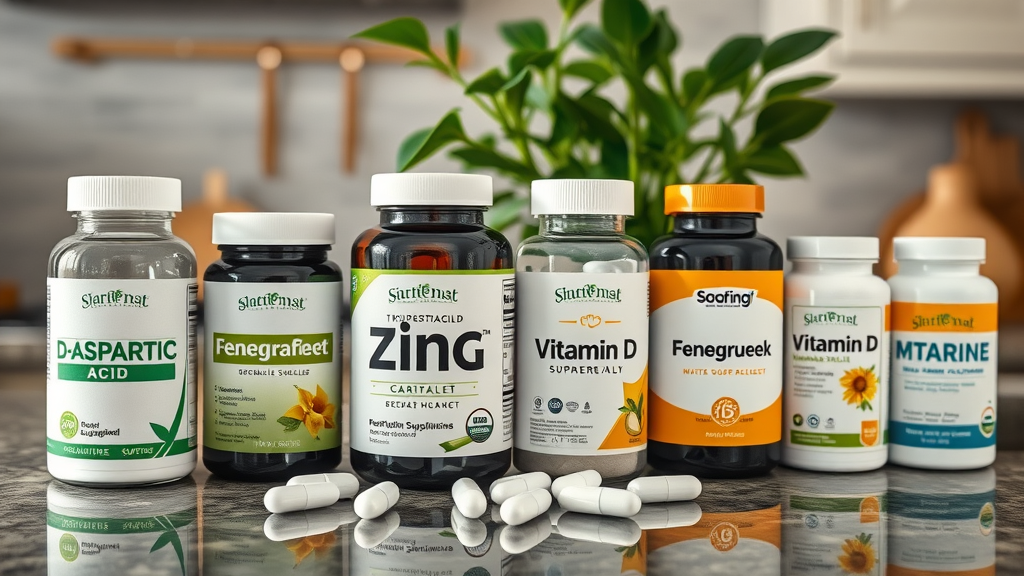Did you know that a man’s testosterone level can drop naturally by about 1% every year after age 30 —impacting energy, mood, and sex drive dramatically? Whether you’ve noticed shifts in your vitality or want to supercharge your wellbeing, understanding testosterone health is your gateway to lasting male vigor. From the truth about replacement therapy to diet hacks and critical medical signs, this definitive guide arms you with everything you need to take control of testosterone now .
Revealing the Truth: Testosterone Health and Surprising Scientific Findings
Many men are unaware of the crucial role testosterone health plays in their lives until symptoms of low testosterone manifest—affecting sex drive, muscle mass, and cognitive function. Research shows that testosterone does much more than support male sex characteristics: it influences red blood cell production, mood stability, and even long-term cardiovascular health. For instance, surprising scientific findings now link testosterone imbalances with increased risk for conditions like obesity, diabetes, and depression, highlighting its far-reaching effects.
In practical terms, a drop in testosterone levels can subtly but significantly erode daily wellbeing: lower energy, diminished confidence, and compromised performance at work or play. Understanding these often-missed signals empowers you to make informed health decisions. From key lab tests to evidence-based interventions, testosterone health is now recognized as a linchpin of male vitality. Below, we’ll uncover the science, correct the myths, and help you build a proactive strategy for lifelong wellness.

Did you know that testosterone levels naturally decrease by about 1% each year after age 30, affecting energy, mood, and sex drive? Explore how testosterone health underpins nearly every area of male vitality.
-
This article will help you:
Recognize the critical signs of low testosterone
Discover science-backed strategies to naturally optimize testosterone health
Understand the risks and benefits of testosterone replacement therapy
Learn to spot misinformation and make informed health decisions
Explore lifestyle and diet tips for maintaining optimal testosterone levels
Understanding Testosterone Health: Hormones, Functions, and Impact
Testosterone is more than just the male sex hormone—it serves as the body’s chief architect of energy, muscle mass, and emotional fortitude. Produced primarily by the testicles and regulated by the pituitary gland, testosterone impacts nearly every area of a man's physiology. This hormone governs the development of male sex organs during puberty, drives libido, and is critical for maintaining steady production of red blood cells. Without a stable testosterone level, both physical and emotional resilience can dwindle.
Beyond reproductive health, testosterone has a hand in cognitive clarity, fat metabolism, and even cardiovascular well-being. Scientific studies highlight that men with low testosterone are more likely to encounter memory lapses, persistent fatigue, and decreased muscle strength. This is why optimizing testosterone health is not simply about sex drive but about building a life of peak performance, motivation, and emotional stability. As we unpack its functions below, it's clear that hormonal health lies at the heart of male longevity.
For those interested in actionable ways to support testosterone through daily habits, exploring the relationship between testosterone and healthy lifestyle choices—including plant-based solutions—can provide additional strategies for natural hormone optimization. Learn more about how lifestyle impacts testosterone in this in-depth guide to testosterone and healthy living .
What Does Testosterone Do for Your Health?
Regulating sex drive and libido: Testosterone’s most famous function is driving sex drive—crucial for sexual satisfaction and reproductive health.
Supporting muscle mass and bone density: This hormone promotes muscle mass gains, energy for workouts, and bone solidity—key factors in preventing fractures and frailty with age.
Affecting mood and cognitive function: Stable testosterone levels support mood balance, memory focus, and emotional resilience.
Influencing fat distribution: Testosterone helps keep body fat in check, supporting a leaner body composition and reducing risks of metabolic disorders.
"Testosterone is much more than a 'sex hormone.' Its influence permeates energy, emotional resilience, and overall health."

Testosterone Level Fundamentals: What’s Normal and Why It Matters
Knowing your testosterone level—specifically total testosterone and free testosterone—is essential for understanding your health status. Normal testosterone levels change with age; what’s typical for someone in their 20s will decline as decades pass. The chart below offers benchmark ranges, but the real magic lies in identifying what’s healthy for you—especially if symptoms of low sex drive, loss of muscle mass, or low energy emerge. Regular blood tests, which measure both total and free testosterone, are the bedrock for accurate diagnosis.
Maintaining normal testosterone levels is not just about avoiding the lows; unusually high testosterone levels can also spell trouble, with risks to mood and heart health. Having baseline knowledge and periodic checkups keeps you ahead of symptoms and lets you spot issues—sometimes before they manifest physically. Tracking testosterone health, guided by your physician, ensures you sustain optimal wellness through life’s seasons.
Normal Testosterone Levels by Age (ng/dL): | |
Age |
Normal Range (ng/dL) |
|---|---|
20-29 |
300–950 |
30-39 |
280–900 |
40-49 |
250–850 |
50+ |
200–750 |
How Do You Know Your Testosterone Is Healthy?
Blood tests for testosterone level and testosterone production: The gold standard is a morning blood test assessing both total and free testosterone, sometimes along with LH, FSH, and SHBG.
Recognizing symptoms: Be alert to signs like plummeting sex drive, unexplained mood swings, fatigue, or muscle mass loss—these often flag imbalances before lab confirmation.
Healthy testosterone is best determined via a combination of blood test results and symptoms, so regular medical assessment is critical—especially if subtle changes in mood, performance, or energy arise. Collaboration with your healthcare team is essential for the most accurate interpretation of your hormone status and individualized recommendations.
Signs and Symptoms of Low Testosterone: What to Watch For
Low testosterone levels can sneak up quietly, sabotaging wellbeing without obvious warning. Most men first notice a drop in sex drive or motivation, followed by persistent fatigue that sleep won’t fix. Muscle mass may shrink while belly fat increases, even if diet and exercise haven’t changed, and mood swings or mild depression may surface unexpectedly.
In some cases, cognitive sharpness fades—concentration becomes difficult and confidence dips. These symptoms often overlap with age-related changes or chronic illness, which is why many cases of low testosterone are overlooked or mistaken for simple burnout. Recognizing and acting on these signs, especially when several cluster together, is vital for restoring optimal testosterone health and protecting long-term vitality.
What Are Signs of Low Testosterone?
Decreased sex drive
Low energy
Loss of muscle mass
Increased body fat
Mood swings or depression
Difficulty focusing
"Low testosterone can silently undermine your confidence, performance, and daily wellbeing—often before you realize it."

Evaluating Testosterone Health: Testing Methods and Clinical Diagnosis
For anyone suspecting low testosterone, clinical diagnosis begins with a blood test, preferably early in the morning when testosterone levels peak. Doctors look at serum total and free testosterone—free testosterone being the biologically active form available to the body’s cells. Elevated or suppressed levels of related hormones, such as LH and FSH from the pituitary gland, as well as Sex Hormone Binding Globulin (SHBG), can help pinpoint the cause.
Diagnosis isn’t just numbers—a low level must accompany real-life symptoms like waning sex drive, muscle mass declines, or persistent fatigue to justify treatment, especially testosterone replacement therapy. Too often, self-diagnosis leads to misuse or unnecessary supplementation, so always consult a healthcare provider for full clinical context before making decisions.
Lab Tests for Testosterone Levels: Interpreting Results
Serum total and free testosterone tests: Measure both the bound (inactive) and unbound (active) testosterone to get a complete picture.
Measuring other hormones (LH, FSH, SHBG): These markers provide insights into possible causes of testosterone deficiency and help guide the best course of action.
Key Test Markers for Testosterone Health: | |
Marker |
Why It Matters |
|---|---|
Total Testosterone |
Overall hormone level; values below age norms may indicate deficiency |
Free Testosterone |
Active form responsible for physiological effects; more predictive of symptoms |
Sex Hormone Binding Globulin (SHBG) |
Regulates how much testosterone is available for use by the body |
Causes and Contributors to Low Testosterone Level
Aging and testosterone production decline: Gradual decrease in testosterone production begins in the 30s and accelerates with age.
Chronic illnesses (diabetes, obesity): These conditions disrupt normal testosterone function and worsen symptoms of fatigue, muscle loss, and low libido.
Environmental factors: stress, sleep, alcohol: High stress, sleep deprivation, and excess alcohol lower testosterone production and accelerate hormonal decline.
Each of these contributors can cause or worsen low testosterone levels. Chronic health issues like obesity and type 2 diabetes are especially detrimental, creating a cycle of hormonal and metabolic disturbances. Meanwhile, lifestyle choices—such as lack of sleep or frequent exposure to blue light screens late at night—disrupt the body’s circadian rhythms and blunt natural testosterone peaks. Heavy drinking and substance abuse further impair hormone production and amplify low levels.
How Lifestyle Impacts Testosterone Health
Poor sleep and erratic circadian rhythms: Deep, quality sleep is essential for peak testosterone production. Erratic schedules and late nights decrease natural hormone output.
Excessive alcohol or substance use: Alcohol and recreational substances negatively impact the testes and pituitary gland, causing testosterone levels to drop.
Chronic stress and cortisol: Prolonged stress keeps cortisol levels high, which directly suppresses testosterone production and accelerates aging effects.

Boosting Testosterone Health Naturally: Diet, Exercise, and Everyday Practices
Improving testosterone health doesn’t start with medication—it begins with your choices at the table, in the gym, and in your day-to-day routines. Regular weight training and high-intensity interval training both increase muscle mass and prompt natural testosterone surges. Nutrition is equally powerful: diets rich in healthy fats (nuts, avocados), zinc (shellfish, pumpkin seeds), and magnesium (leafy greens, legumes) directly support robust hormone production.
Other foundational habits—such as sleeping 7-9 hours nightly, managing stress through mindfulness or relaxation exercises, and curbing alcohol—strengthen your body’s testosterone axis. These lifestyle tweaks often yield noticeable improvements in sex drive, energy, and lean physique within just weeks. Incorporating these science-backed routines can prevent the decline associated with aging and keep testosterone levels thriving for years to come.
How Can I Raise My Testosterone Level?
Weight training, HIIT, and regular physical activity: Increase muscle mass and promote hormonal health.
Balanced nutrition: Prioritize healthy fats, zinc, and magnesium for optimal testosterone production and function.
Adequate sleep and stress management: Prioritize restorative sleep and minimize chronic stressors for long-term testosterone health.
"Even a single week of improved sleep and resistance training can elevate testosterone levels measurably."

Supplements, Herbs, and Biohacks for Testosterone Health
D-Aspartic Acid, Zinc, Fenugreek
Vitamin D supplementation
The science behind adaptogens and testosterone support
While lifestyle is the foundation, certain supplements can offer extra support—especially if labs reveal borderline or low levels. D-Aspartic Acid has been shown to boost testosterone production temporarily, while zinc and fenugreek demonstrate benefits for men with low testosterone levels . Vitamin D, often low in adults, is tied to healthy testosterone and immune function. Adaptogenic herbs like ashwagandha may help by mitigating stress and optimizing hormonal balance over time.
Before adding any supplement, ensure you’re sourcing products with proven clinical support. Not all formulations deliver the same effectiveness or absorption—liquid, nano-drop, or quantum strips often have superior bioavailability. Consult with your physician and use supplements as adjuncts, not substitutes, for healthy lifestyle habits and medical care.
Evidence-Based Supplements for Testosterone Health: | ||
Supplement |
Dosage |
Clinical Support |
|---|---|---|
D-Aspartic Acid |
2–3g/day |
Shown to increase testosterone over several weeks in select men |
Zinc |
25–40mg/day |
Deficiencies linked with low testosterone; supplements restore levels |
Vitamin D3 |
2000–5000 IU/day |
Correcting deficiency often improves testosterone and vitality |
Fenugreek |
500–600mg/day |
Some evidence supports lean mass and libido benefits |

Understanding High Testosterone: When Levels Exceed the Norm
While low testosterone garners the most attention, high testosterone levels can carry their own risks. Some men, such as competitive athletes or those using anabolic steroids, may have abnormally high testosterone. This state can boost muscle mass and athletic performance in the short term, but side effects are significant: increased aggression, mood swings, acne, and elevated cardiovascular risks. Long term, high levels can also suppress natural testosterone production and disrupt fertility.
The key is balance. Extremely high testosterone—well above the normal reference range for your age—should always be evaluated by a healthcare professional. Blood test confirmation and clinical assessment help ensure that muscle gains or boosted drive aren’t coming at a dangerous health cost.
What is Considered a High Testosterone Level?
Health implications: Risk of cardiovascular issues, acne, irritability, and even sleep apnea.
Athletic performance: Short-term muscle mass and recovery gains may be offset by negative side effects.
Associated risks: Mood swings, potential suppressed sperm count, and risk to long-term hormonal health.

Testosterone Replacement Therapy (TRT): Who Needs It and When?
When natural means aren’t enough, testosterone replacement therapy (TRT) can be a life-changing tool for men with confirmed testosterone deficiency. Physicians prescribe TRT when blood test results reveal persistently low testosterone accompanied by clear symptoms—such as low sex drive, muscle mass loss, or relentless fatigue. Only medically confirmed low testosterone qualifies for treatment, ensuring safety and efficacy while avoiding side effects from unnecessary hormone use.
TRT is now available in diverse forms—injections, patches, topical gels, nano-drops, and oral strips. Each method has its pros and cons, but all aim to restore testosterone to a healthy range, improving sex drive, energy, and mood. The right method is determined in partnership with your healthcare provider, considering convenience, absorption, and medical background to maximize both results and safety.
What Is Testosterone Replacement Therapy?
When doctors prescribe replacement therapy: Clinically low levels confirmed via repeated morning blood tests and presence of moderate to severe symptoms.
Forms: Injections, patches, gels, nano-drops, liquid formulations, and oral strips, all designed to deliver stable testosterone replacement.
Benefits and Risks of Testosterone Replacement
Improved sex drive, muscle mass, and energy: Most men experience dramatic improvements in sex drive, emotional well-being, muscle mass, and red blood cell count within several months of starting TRT.
Possible side effects: Includes skin changes, mood elevation or aggression, cardiovascular strain, minor fluid retention, and rare sleep disturbances or fertility changes.
Testosterone Therapy, Prostate Cancer, and Safety Considerations
For decades, the link between testosterone replacement therapy and prostate cancer was widely misunderstood. However, new comprehensive research reveals that, when properly monitored, TRT does not significantly increase the risk of prostate cancer for most men. This represents a major shift in clinical guidelines, allowing physicians to prescribe replacement therapy more confidently to men in need.
Nevertheless, it’s crucial to assess personal and family history, baseline PSA levels, and track for any warning signs of urologic disease. Men with prostate or breast cancer should generally avoid TRT unless under highly specialized care. For all others, individualized risk assessment, shared decision-making, and continuous monitoring ensures both efficacy and safety throughout the course of hormone therapy.
Is There a Risk of Prostate Cancer with Testosterone Replacement?
Research linking prostate cancer and testosterone therapy: Large systematic reviews now indicate that, for most men, the risk does not materially increase on well-managed TRT.
Risk assessment and current guidelines: Work with your doctor to monitor PSA and prostate health before and during treatment.
"Recent studies suggest that properly monitored testosterone therapy does not significantly increase the risk of prostate cancer for most men."
Long-Term Maintenance of Testosterone Health: Keys to Aging Well
Regular checkups and monitoring testosterone levels
Sustainable lifestyle practices for hormone health
Testosterone health is a lifelong journey, not a quick fix. Sustaining healthy levels into old age requires ongoing medical monitoring and deliberate lifestyle habits. Annual blood tests, even after beginning replacement therapy or seeing improvements from lifestyle change, ensure important shifts do not go unnoticed. Regular exercise, sleep optimization, dietary vigilance, and stress management remain the pillars for lasting hormone health—especially as you age.
Tracking and Interpreting Testosterone Production Over Time
Monitoring trends in testosterone production year-over-year gives you the data to respond to emerging issues early, adjust regimen for better results, and protect cognitive and physical vitality. Tracking your personal hormone baseline is essential as each individual may fall within a unique range—so work in partnership with your medical team to interpret changes in total testosterone and free testosterone over time.

Debunking Myths: Facts vs. Fiction in Testosterone Health
Separating internet myths from clinical evidence on testosterone replacement
The truth about supplements, replacements, and natural boosts
Myths about testosterone health abound: that all supplements work equally well, that testosterone therapy causes cancer, or that "boosters" can magically reverse all symptoms overnight. The evidence is clear: only specific lifestyle and evidence-based supplements impact testosterone levels meaningfully. Replacement therapy, when prescribed for true deficiencies, is not the health risk popular media suggests—especially in regard to prostate cancer. Don't rely on hype or hearsay; base your choices on medical guidance and the latest research.
When to Consult a Professional About Testosterone Health
Recognizing red flags for low testosterone
What to ask your doctor
If you experience persistent symptoms of low testosterone—such as flagging energy, low sex drive, or unexplained mood changes—don’t ignore them. Timely consultation with a healthcare professional is essential for accurate diagnosis and effective management. Prepare to discuss all your symptoms, health history, medications, and any supplements you take. Request a blood test for total and free testosterone levels, and be ready to review options from lifestyle change to testosterone replacement if needed.
People Also Ask About Testosterone Health
How can I raise my testosterone level?
You can raise your testosterone level through a combination of regular strength training, eating nutrient-dense foods (such as those rich in healthy fats, zinc, and vitamin D), prioritizing sleep, managing stress, and avoiding excessive alcohol consumption. In some cases, clinically diagnosed low testosterone may benefit from therapy under medical supervision.
What are signs of low testosterone?
Common signs of low testosterone include low sex drive, decreased muscle mass, increased fat accumulation, persistent fatigue, mood swings or depression, difficulty concentrating, and sometimes erectile dysfunction.
What does testosterone do for your health?
Testosterone is essential for maintaining sex drive, supporting muscle and bone mass, regulating fat distribution, influencing mood, and preserving overall male vitality and cognitive health.
How do you know your testosterone is healthy?
The best way to confirm healthy testosterone levels is through standardized blood tests that measure total and free testosterone. Regular lab work combined with evaluation of symptoms gives the clearest picture of hormone health.
Summary Guidance for Testosterone Health: Key Steps to Take
Track changes in energy, mood, and performance
Obtain lab tests if you notice symptoms
Prioritise foundational habits: sleep, stress, exercise, and diet
Consider clinical therapies with your healthcare provider only if necessary
Revisit information regularly to stay proactive about your testosterone health
Your Next Steps to Vitality
💧 Want to feel the difference absorption makes? See the supplements we recommend for maximum impact — and why liquids, nano-drops, and quantum strips work better. 👉 Discover Our Top Picks →
Optimising testosterone is just one piece of the broader puzzle of holistic health. If you’re ready to take your wellness journey further, consider how hormone balance interacts with other aspects of your lifestyle, from nutrition to mental wellbeing. For a deeper dive into the interconnectedness of hormones and healthy living, explore our comprehensive overview on testosterone’s role in a healthy lifestyle . And if you’re curious about how gut health and mood are linked, discover new perspectives in this article on gut health and depression . Your path to vitality is ongoing—keep exploring, learning, and building a foundation for lifelong wellbeing.

 Add Row
Add Row  Add
Add 

Write A Comment